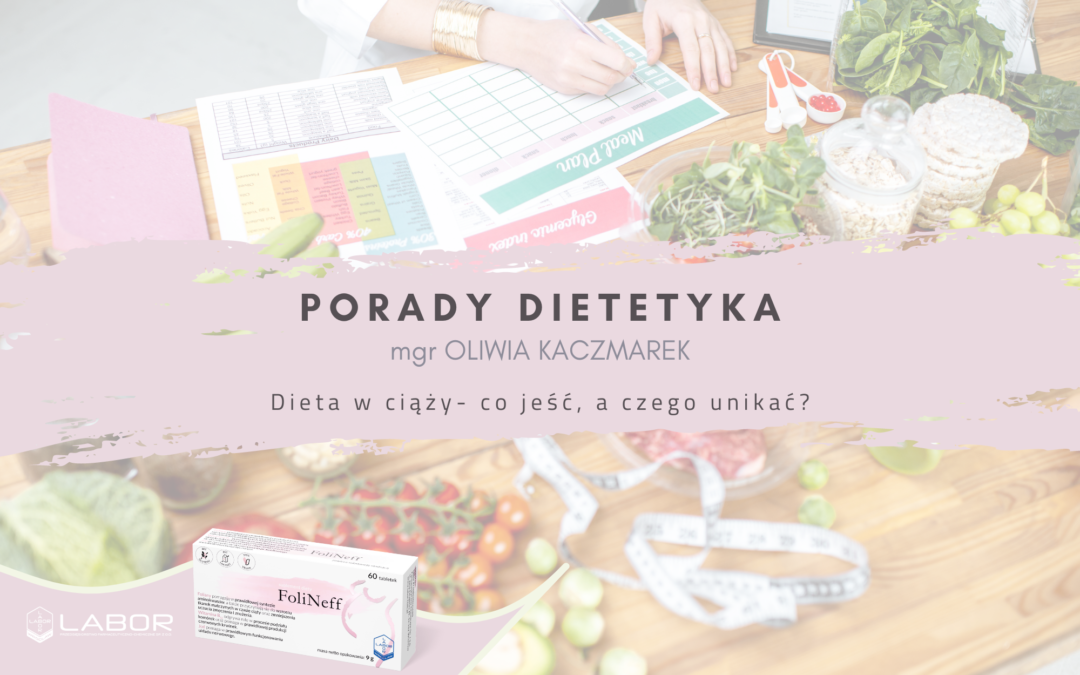Pregnancy is a special time in every woman’s life. During this period, it is extremely important to take care of a healthy, balanced diet and lifestyle, which have a positive effect on the well-being and health of the future mother and the child’s development.
RULES OF A DIET
The diet of pregnant women should be varied, balanced and in line with the principles of healthy eating. Meals should be eaten regularly at fixed times and include as much fresh and natural food as possible.
The amount of calories
During pregnancy, the energy requirement increases (due to the growth of the fetus, placenta and more intense work of the heart), nutrients and fluids (at least 2-2.5 liters per day). During the first trimester of pregnancy, energy requirements remain the same as before pregnancy. Only in the second trimester a woman should increase the caloric value of the diet by about 360 kcal per day, and in the third trimester by 475 kcal in relation to the period before pregnancy. These values ??correspond to an additional meal or 1-2 snacks.
Carbohydrates
The main source of energy supplied with the diet should be complex carbohydrates. Wholemeal products provide more valuable vitamins, minerals and dietary fiber compared to highly refined products made of light flour. During pregnancy, many women struggle with constipation, so you should take care of the supply of dietary fiber. The right choice will be: whole grain bread, buckwheat, millet, pearl barley, brown rice, bran, oatmeal, spelled flour. The sources of dietary fiber are also vegetables and fruits, which should be eaten in an amount of 400 g per day. They should be as varied as possible, served mainly raw, thanks to which they will retain more vitamins, but also boiled, baked and stewed.
Protein
During pregnancy, the need for protein increases as it is the building material for the baby’s organs and tissues. Lean meats (chicken, turkey, veal, lean beef), eggs, milk and dairy products (natural yoghurt, kefir, buttermilk, cottage cheese) and legume seeds (chickpeas, lentils, peas, beans) are recommended. Twice a week, meat portions should be replaced with fatty sea fish, which provide not only protein, but also magnesium, iodine, potassium, vitamins A, D and E and polyunsaturated fatty acids. It is best to choose non-predatory, short-lived species (herring, pollock, Norwegian salmon, sprats), inhabiting large waters such as the Atlantic, Pacific and North Sea.
Fats
EFAs, i.e. unsaturated fatty acids, are particularly important for the proper course of pregnancy. The fatty acids provided will be used to build new cells in the child’s body. Polyunsaturated fatty acids from the omega-3 (?-linolenic) and omega-6 (?-linolenic) families have a particularly beneficial effect on health. They can be found not only in fatty sea fish (150 – 200 g of sea fish provides 2 g of omega ? 3 acids) but also in vegetable oils: olive oil, rapeseed oil, sunflower oil, pumpkin seed oil and evening primrose oil. Other good sources of fatty acids are seeds, nuts and seeds containing equally important ingredients for the development of the fetus, including zinc, magnesium and iron.
What to avoid and what to watch out for during pregnancy?
A woman expecting a baby should take best care of her lifestyle, diet and avoid harmful substances that may pose a threat to the child’s development.
? You should completely avoid drinking alcohol, smoking and exposure to cigarette smoke. These are toxic compounds and substances that pass through the placenta into the bloodstream of the fetus, which, even in small amounts, may pose a risk of disorders during pregnancy and abnormal development of the child.
? The expectant mother should be careful about unpasteurized dairy products, ie long-ripening cheese, blue cheese, feta cheese, camembert and seafood. These products can be the source of a bacterium called Listeria monocytogenes, which causes acute food infections and can even lead to premature birth or miscarriage.
? Eating raw or undercooked meat can also prove dangerous to a developing baby. Raw sausages, Parma ham, tartare or bloody beefsteak can cause infection with toxoplasmosis, caused by the protozoan Toxoplasma gondii.
? Pregnant women are at increased risk of salmonellosis infection, and therefore should not eat raw or undercooked eggs. Vegetable sprouts such as alfalfa, clover, radish, and mung beans can also be contaminated with Salmonella, and are therefore not recommended during pregnancy.
? Remember that highly processed, sweet or fatty products promote the accumulation of adipose tissue and contribute to weight gain. Fatty and difficult to digest products may also aggravate digestive ailments, e.g. heartburn. In the case of gestational diabetes, sweets should be completely eliminated from the diet.
? Certain species of fish, such as swordfish, tuna, halibut, perch, eel, butterfish, shark, are not recommended for pregnant women due to the presence of significant amounts of toxic substances in their meat, such as mercury, cadmium or lead. Smoked fish containing carcinogenic nitrosamines and a large amount of salt are also not recommended during pregnancy.
? Due to the adverse effects of caffeine on the fetus, it is recommended that all products containing caffeine be limited to 200-300 mg per day. It should be remembered that not only coffee contains caffeine, it can also be found in: tea, cocoa, cola drinks, energy drinks and chocolate. It is not necessary to completely give up drinking coffee, a maximum of 2-3 cups a day is allowed. Traditional coffee can be replaced with grain coffee, which, thanks to the fiber, will facilitate the work of the intestines and help with constipation often occurring during pregnancy.
VITAMINS AND MINERALS IN PREGNANCY
Folic acid
Folates play an important role in the process of cell division, proper blood production and the growth of maternal tissues during pregnancy. Their deficiency is associated with a higher risk of neural tube defects in the fetus and cleft lip and palate. Folic acid is found mainly in leafy vegetables (lettuce, spinach, kale, parsley), broccoli, citrus fruits, legumes, as well as in meat, liver, kefir and cereals. The absorption of folic acid from the diet is approximately 50%, therefore it is recommended to start supplementation 4-12 weeks before pregnancy. Taking folic acid will significantly reduce the risk of baby defects and prevent premature birth.
Vitamin B12 (cobalamin)
Vitamin B12, apart from folic acid, is essential for the formation of red and white blood cells and the synthesis of amino acids and bone marrow proteins. Deficiency inhibits cell maturation and multiplication, degeneration of the spinal cord and peripheral nerves. The main sources of cobalamin are liver, but are found in smaller amounts in meat, dairy products and egg yolks.
Iodine
During pregnancy, it is recommended to limit the consumption of table salt, which may increase the deficiency of this ingredient. The reduced supply of the ion may result in damage to the central nervous system, hearing loss or deafness in the newborn. According to the recommendations, it is recommended to supplement with a dose of about 200 micrograms per day.
Supplementation with multi-ingredient preparations increases the chance for the proper course of pregnancy. It is worth paying attention to the fact that the dietary supplement contains the necessary vitamins and minerals that will complement the daily diet. There are many products on the market that are helpful for pregnant women, one of them is FoliNeff, which is high in folic acid, iodine and vitamin B12.
10 RULES OF A PROPER DIET IN PREGNANCY:
? Eat a varied diet
? Eat for two, not for two
? Choose fresh, top-quality products
? Limit coffee drinking, eating sweets, and adding salt to your food
? Give up drinking alcohol and smoking
? Drink about 2-2.5 liters of liquids (water, freshly squeezed vegetable and fruit juices, red tea)
? Make sure that every meal includes products that are a source of protein (dairy products, meat, fish, eggs, legume seeds)
? Eat whole grain cereal products
? Choose healthy fats, rich in omega-3 and omega-6 fatty acids (including olive oil, rapeseed oil)
? Choose healthy snacks, and eat vegetables, fruit, or nuts in between meals.
Bibliography:
? Rekomendacje Polskiego Towarzystwa Ginekologicznego w zakresie stosowania witamin i mikroelementów u kobiet planujących ciążę, ciężarnych i karmiących, Ginekol Pol. 5/2014, 85, 395-399
? Żywienie kobiet w ciąży, Instytut Matki i Dziecka Klinika Położnictwa i Ginekologii
? Suplementacja folianów w okresie przedkoncepcyjnym, w ciąży i połogu, Rekomendacje Polskiego Towarzystwa Ginekologów i Położników, Ginekologia i Perinatologia Praktyczna 2017 tom 2, nr 5, strony 210?214 Copyright, 2017 Via Medica
AUTHOR: mgr Oliwia Kaczmarek




